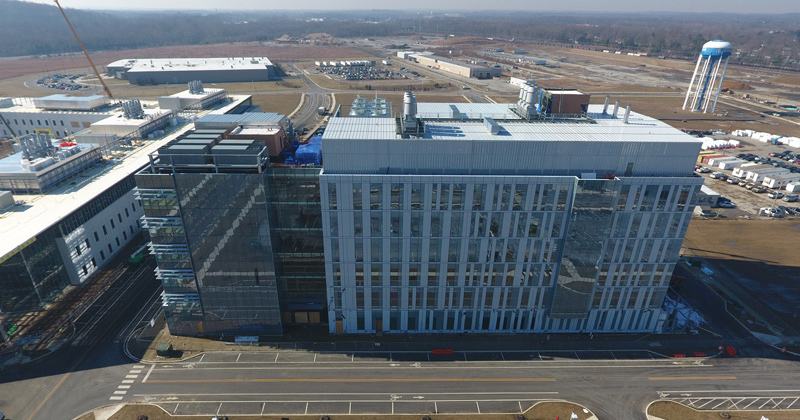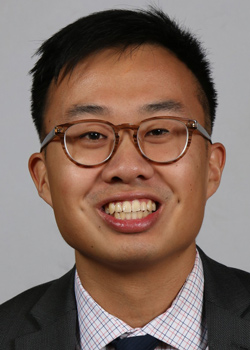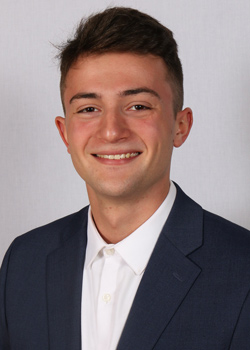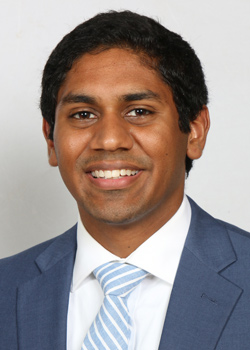


Training for success
Photo by Evan Krape June 03, 2021
New biopharmaceutical sciences master’s program launches with industry support
Fueled by generous philanthropic support and insights from industry partners, the University of Delaware launched a new master’s program in biopharmaceutical sciences in June.
AstraZeneca, Bristol Myers Squibb and Merck & Co. contributed leadership support to lay the foundation for the program and will provide the first cohort of students with funding, extended internships and mentorship. In addition to the philanthropic gifts which will help create equity and access for students of underrepresented groups, executives from the companies helped shape the vision and program experience. Their input and expertise ensure students are gaining valuable knowledge and experiences that will enable them to contribute more quickly and meaningfully once they join the industry workforce after graduation.
“The University of Delaware prides itself on our innovative partnerships and impactful collaborations, and this new program demonstrates the value of industry and academia coming together for our students, faculty, staff and the community beyond,” said UD President Dennis Assanis. “I’m truly grateful to our partners who have provided expertise and leadership support to help launch this innovative new program.”
The master’s program
The biopharmaceutical sciences master’s program, which focuses on the field of complex medicines made from living cells or organisms, includes traditional class and lab work, but will also feature unique opportunities with industry partners including case study presentations, guest speakers, mentoring and a 15-month internship.
“This timely, innovative program offers a unique academic and experiential learning opportunity for students across the University,” said College of Engineering Dean Levi Thompson. “Our holistic approach provides students with experiences relevant to the biopharmaceutical industry, enabling them to make a difference now while preparing for successful careers after graduation.”
The team which designed the intensive program included UD faculty and industry representatives and is aligned with University programs such as the National Institute for Innovation in Manufacturing Biopharmaceuticals (NIIMBL).
“As we at UD continue to increase our engagement with companies in the biopharmaceutical manufacturing industry, they are sharing the skills and experiences they wish new employees had, but aren’t being taught in traditional undergraduate and graduate programs,” said Kelvin Lee, Director of NIIMBL and Gore Professor of Chemical and Biomolecular Engineering. “So, we developed a program to specifically teach some of these skills. Students will gain a better understanding of how the biopharma industry works in developing, discovering and manufacturing of medicines, the business operations effect on the research side and issues that arise being a highly regulated industry. The knowledge will not only make the students more attractive to potential employers, but will move them along faster in successful careers and impactful discoveries.”
In addition to more in-class experiences with industry partners, the most unique requirement is the internship that will last the full 15 months of the master’s program.
“When students are in the classroom, they don’t always think about the real-world context for problem solving, but industry partners will give the students the opportunity to solve problems with financial and regulatory considerations as well as the hands-on experience during the extended internship,” said Millie Sullivan, Alvin B. and Julie O. Stiles Professor and Associate Chair of Chemical and Biomolecular Engineering. “The internships will be a unique way to apply conceptual learnings from the classroom while the students work part-time with a biopharma company and simultaneously take classes part time. The 15-month internship was actually suggested by the industry because they really wanted the students to be able to take on real roles, on real teams working on real problems.”
The support from the industry partners — AstraZeneca, Bristol Myers Squibb and Merck & Co. — enabled the launch of the program and created greater access for students. The funding, multidisciplinary approach and partnerships with other programs at UD all contribute to one of the primary goals of the support and program composition: increasing opportunities and accessibility for students from underrepresented groups.
“It was really important as we developed the program at UD to be as inclusive as possible from the perspective of the students and companies and to effectively serve students who come from traditionally underserved populations” said Lee. “This industry has pretty high salaries relative to almost all other business sectors, and students who can learn more about the field and see the industry perspective as part of their education will be well-positioned for success. So, we wanted to make sure we could open the door to more opportunities and greater success for diverse students.”
Leadership partners
The supporting companies share common goals including creating a stronger, more well prepared workforce, creating opportunities for underrepresented students that will create a more diverse pipeline for the industry and, ultimately, ensuring patients receive lifesaving medicines and treatments faster.
As the program launches this June, the company supporters and partners will be hosting the first cohort of five students for the 15-month internships, exposing the participants to many facets of the industry.
“It’s not often that we are part of establishing a program like this,” said Michael Thien, senior vice president at Merck and member of UD’s Biopharmaceutical Innovation Advisory Board. “This has given us the opportunity to provide a lot of input as to the relevant experiences and knowledge we are looking for in the students as we bring them on board after graduation. We can ensure that we are teaching these students not only about where the biopharma industry is now, but where it’s going. One of the areas that will be really helpful for the students to learn about is data science: how to address ‘big data’ questions and analyze very large streams of data. Since the biotech revolution in the late 80s, changes were largely incremental. But now we’re seeing the industry take a huge step forward and students need to be ready to take on this new world that includes machine learning and artificial intelligence for data processing. They are digital natives that grew up in a digital world, but they will need to make sure they understand the fundamentals of data analytics and know what to do with it.”
Gail Wasserman, senior vice president of biopharmaceutical development, research and development at AstraZeneca and member of UD’s Biopharmaceutical Innovation Advisory Board, said AstraZeneca’s support is part of “paying it forward” to academia and being a part of making change in the industry while providing underrepresented students new opportunities in the field.
“From an aspirational standpoint, there is a real desire to be able to train for the future and education is at the core of it — you can’t do new things if you don’t learn how to do them,” Wasserman said. “When we train scientists of the future, including those coming out of this master’s program, they will be able to contribute sooner, and more directly. And the program’s diversity and equity are very much in line with our culture as a company. In this field you don’t need to look far to see a lack of diversity, so this is providing an opportunity. No matter how you cut diversity — age, gender, cultural background, academic pathway — some of the best teams who come together are some of the most diverse because there is a wonderful mix of ideas and thinking.”
David Elkins, who graduated from UD in 1991, is executive vice president and chief financial officer of Bristol Myers Squibb and member of UD’s Biopharmaceutical Innovation Advisory Board. He agreed with Thien and Wasserman regarding the need to train diverse students on new equipment and processes in the industry. He added that they will also experience the result of their efforts: helping patients.
“In science and innovation, speed is of the essence, because our patients are dealing with life-threatening illnesses,” Elkins said. “We often say, ‘patients are waiting,’ because they are waiting for a medicine or treatment to help them in their fight against these serious diseases. It’s such a rewarding experience to know a product you had a hand in developing and manufacturing had a positive impact on someone’s life. I believe this program will help ignite the students’ passion to serve others and help accelerate their development to have a meaningful impact in healthcare innovation. I hope they walk away from this program and a Bristol Myers Squibb internship with a passion for serving others and a spirit of collaboration.”
The company supporters agree UD is well poised to launch this innovative biopharmaceutical sciences master’s program because of the faculty expertise, the campus’ central location, the infrastructure and the industry relationships being established through the Biopharmaceutical Advisory Board and key initiatives such as NIIMBL.
“A critical mass of people need to be interested in students coming out of a new program like this to make it worthwhile for students and for the University,” Thien said. “The University acted smartly: UD didn’t just say, ‘We’ll build it and see if they come.’ Instead, the UD team went to those they are building this program for — industries — and asked what we’re looking for to build a strong workforce pipeline. We in industry have a lot of faith in the program because of what UD has already been able to do through NIIMBL. Industry has been heavily involved in NIIMBL, and we have already benefited from training modules and research, so this program is being done by the same people. We don’t look at this as a start of a relationship with UD because we have been working with them and recruiting from the University for years. So, we see this as a continuation, and a deepening, of what has been a great relationship to date.”
For more information about how you can help shape biopharmaceutical sciences at UD, contact Dana Raftas at draftas@udel.edu.
First group of master’s students
The first five students who will participate in the inaugural biopharmaceutical sciences master’s program received their undergraduate degrees in chemical and biomolecular engineering in 2021 and now are moving on to the transformational program with the hope of earning their master’s degree in 2022.

Logan Kim
Q: Why did you choose to be part of the first cohort for the master’s program and what are you most looking forward to as you begin?
Kim: I feel really lucky to be part of the first class and happy to be part of this wonderful opportunity. The program is really interesting and unique because it is an integration of academics and the classwork of biopharmaceutical sciences alongside an industry internship. That is something I didn’t see in other post graduate opportunities I looked into when looking for a graduate program. I’m looking forward to gaining more through the academics while working in the industry on meaningful projects.
I’m also most looking forward to getting to know as many people as possible in the biopharmaceutical industry through the classes and internship. I’ll gain experience and interact with many people in the biopharma industry, which will open up connections and grow my network.
Q: What impact do you hope to have with your studies/research during the program? What impact do you hope to have beyond UD?
Kim: One of my down-the-line career goals is to get into biopharmaceutical regulations. The pharmaceutical industry is highly regulated, and drug pricing is determined by that and a lot of outside factors like insurance. It’s important to make good biopharmaceutical products, but it’s also important to make sure those products are affordable and accessible.

Jason Houser
Q: Why did you choose to be part of the first cohort for the master's program?
Houser: I’m very excited to be a part of this program, and I think it’s being implemented at the perfect time because the infrastructure is in place for us to successfully take classes online while we’re also going to internships in New Jersey, Maryland and Pennsylvania.
Normally we wouldn’t be able to do that with such ease — the program would have worked out, but for the elective classes we’d have to really search for and be limited in online options. But with the new academic environment, I know the classes I need and want to take will be available online.
Q: What are your career aspirations and what impact do you hope to have, either through the program or beyond UD?
Houser: Optimistically, I’d love to be part of a team that finds a cure for chronic disease. I think that’s what a lot of people in the field are hoping for as they work on meaningful projects.
At the end of my career, I want to know I was on a team that helped do something monumental in curing a disease or creating a therapeutic treatment for a condition. It would also be great to discover a new process that makes yield 100% better, just something with a substantial impact.

Keith Morgan
Q: What do you look forward to most as you look ahead to beginning the new biopharmaceutical sciences master's program?
Morgan: I worked at MRICD, a medical research facility, so I have conducted countless biochemical assays and data analyses of said assays that have focused on improving the human experience, so I'm so excited to be working on a biochemical task with the same goal again. So, I can further increase my laboratory skills, general knowledge, and experimental/process design skills and demonstrate what I have learned already.
Q: What impact do you hope to have with your studies/research during the program? What impact do you hope to have beyond UD?
Morgan: The biopharmaceutical industry is exciting because it manipulates the interesting natural processes in living organisms with the goal to help people, like my father, a two-time cancer survivor. I am extremely excited by the idea of using biopharmaceutical technology to target cancer cells and other life-altering diseases, improving people’s lives by mitigating symptoms or combating the problem itself. This groundbreaking industry will help change the public’s distrust in the industry, and science in general, as innovations increase accessibility to revolutionary medications, which will improve relations and increase funding. I am incredibly excited to be part of an industry that will help the world.
Q: What are your career aspirations, and how do you think participating in the master's program will help you reach your goals?
Morgan: In my past research at the Army Research Laboratory at Aberdeen Proving Ground, I worked on solving biological problems such as acetylcholinesterase inhibition due to nerve agents. I understood why that research was so important, especially growing up in a military family and seeing the effects chemical agents had on my father. This program presents the unique opportunity to understand better how business, communication and regulatory information may have been overlooked in the engineering problem throughout my growth by engaging with professors, industry educators and regulatory scientists. Finally, I am excited to use my knowledge of biological, chemical and physical processes to further my goal in this future career field to develop solutions to human health problems.

Nathan Edwards
Q: What do you look forward to most as you look ahead to beginning the new biopharmaceutical sciences master’s program?
Edwards: I look forward to connecting and applying classroom learning to real-life scenarios in industry during the program and gaining a holistic understanding of the current landscape of healthcare through the diverse perspectives and approaches offered by leaders in industry, academia and government.
I’m excited by the variety of work in the biopharmaceutical industry, through which I can help others around the world by improving patient outcomes. In addition, the work is meaningful and practical, and its effects are tangible. I’m energized by the idea of being a part of a field that is motivated to create life-changing products that make an impact in the lives of patients and their family and friends. I’m also excited by the potential opportunity to work cross-functionally at the leading edge of biotechnology and medicine with experienced professionals. Being able to work with people of different backgrounds will further my professional development and skills and allow me to make significant contributions to healthcare, especially in the areas that I’m passionate about.
Q: What impact do you hope to have with your studies/research during the program? What impact do you hope to have beyond UD?
Edwards: During and long after this program, I hope to advance progress in medicine and healthcare, contributing to the overall process by working with individuals all along the pipeline. I would also want to work in some capacity to effect changes in health policy in the industry. I consider it most important that life-changing products be readily available and affordable to increase the quality of life of patients. Thus, it is also essential to make changes to current manufacturing processes and introduce new ones as well.
Biopharmaceutical sciences is at the intersection of my goals in transforming healthcare for patients. These include improving manufacturing processes, introducing new products for less common or relatively untreated diseases and affecting changes in health policy, especially with the intention of "closing the gap" in global healthcare across populations with unmet needs. By participating in the master's program, I hope to start working toward some or all of these goals.

Jim Ervin
Q: What impact do you hope to have with your studies/research during the program? What impact do you hope to have beyond UD?
Ervin: Something which I have come to learn and appreciate in my time at UD is how diverse the realm of chemical engineering is, and how my degree enables me for many possible lines of work — the options are almost paralyzing in their diversity. However, I've always felt strongly about biopharma because — among all other branches of chemical engineering — it has the most direct impact upon human life. No other chemical engineering discipline has the same human element, from my perspective, and the opportunity to directly help people is what makes me excited about biopharma and this program.
Q: What are your career aspirations and how do you think participating in the master’s program will help you reach your goals?
Ervin: I see myself working in the industry for at least three to five years before considering higher education. I've always been interested in higher education, but wanted to get some real-world experience first, which I figured would help me identify scientific areas that I am particularly interested in. This program is a great bridge to span the gap between being a student and an employee. As I've applied to positions, even the lowest starting engineering roles will list a requirement of more than a year of experience. To me, this program is a great way to gain that experience while also continuing my studies.
Contact Us
Have a UDaily story idea?
Contact us at ocm@udel.edu
Members of the press
Contact us at mediarelations@udel.edu or visit the Media Relations website

